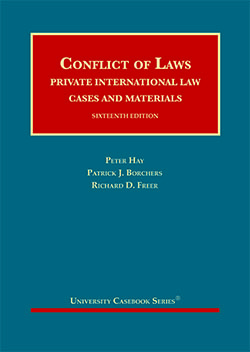
The authors of the sixteenth edition are proud of the book’s heritage, which dates to 1936.
At the same time, they are mindful of the needs of students and professors addressing the Conflict of Laws eight decades later. We continue to add the subtitle “Private International Law” to acknowledge the more common title of the subject outside the U.S., as well as to alert students that they will face a blend of domestic and international issues once they become lawyers. As an intellectual matter, the conflicts course presents rich and nuanced doctrine. As a professional matter, every litigator will face issues raised in this course. As a practical matter, an increasing number of students are drawn to the course because it is tested on the bar exam in every state that has adopted the universal bar exam or the multistate essay exam. The authors recognize the need, therefore, to provide appropriate review of civil procedure to allow the student to transition to the study of conflicts.
A modern conflicts casebook must be flexible. Some professors will choose to cover a great deal of international and comparative law. Others, however, will prefer to address conflicts only in the domestic sphere. This edition fully supports either (or some middle) approach. The professor may comfortably choose how much international and comparative material to cover without losing transition or context.